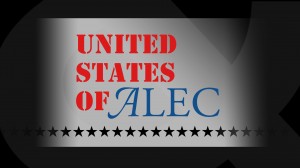 Last year, Moyers & Company aired the “United States of ALEC,” a report on the American Legislative Exchange Council, a corporate-backed political powerhouse that’s bringing profit-driven legislation to a statehouse near you. ALEC brings together lobbyists and state legislators to create “model legislation” that could benefit corporate interests — laws, for example, that would serve to weaken collective bargaining rights, limit corporate liability and increase the populations at for-profit prisons. And it all takes place behind closed doors. The goal is to get ALEC legislators to pass versions of model laws in their home states. And pass them they do — ALEC boasts that some 200 of its bills become law each year.
Last year, Moyers & Company aired the “United States of ALEC,” a report on the American Legislative Exchange Council, a corporate-backed political powerhouse that’s bringing profit-driven legislation to a statehouse near you. ALEC brings together lobbyists and state legislators to create “model legislation” that could benefit corporate interests — laws, for example, that would serve to weaken collective bargaining rights, limit corporate liability and increase the populations at for-profit prisons. And it all takes place behind closed doors. The goal is to get ALEC legislators to pass versions of model laws in their home states. And pass them they do — ALEC boasts that some 200 of its bills become law each year.
2013 legislative sessions are in full swing in state capitols across America, and ALEC has once again managed to fit its sticky fingers into scores of legislative cookie jars. This year, renewable energy, state-funded education and your tax dollars are among the many items poised to be gobbled up.
ALEC makes no bones about its opposition to state Renewable Energy Standards (RES), which require that states derive a certain percentage of energy from renewable sources. Todd Wynn, the director of ALEC’s energy task force, told Bloomberg News outright that ALEC is opposed to such mandates, going as far as to say: “Natural gas is a clean fuel, and regulators and policymakers are seeing how it’s much more affordable than renewable energy.”
ALEC’s anti-renewable rancor has had a powerful effect. This year, several states have considered corporate-friendly efforts to reduce or repeal renewable energy targets. And more often than not, the sponsors of these bills turn out to be verifiable members of ALEC. (Which isn’t to discount the unverifiable ones. ALEC’s legislators tend to keep their membership hush-hush, and ALEC discloses no membership lists.) But the keyword to keep in mind here isn’t “energy,” or “renewable,” or even “law” — it’s “profits,” the real driver behind ALEC’s legislative agendas. With corporations like Exxon Mobil, Chevron, the American Electric Power Company and Marathon Oil schmoozing lawmakers at ALEC conferences, it’s no wonder these anti-renewable energy bills have become a staple of the ALEC agenda.
Some states are fighting back, however: just last week, North Carolina defeated an ALEC-inspired bill that would have severely weakened the state’s Renewable Energy Standard. It remains to be seen if other states will follow in its footsteps.
Moving west to South Dakota: The Aberdeen News reports that the South Dakota legislature’s executive board has signed off on using taxpayer funds to pay for some state legislators to travel to ALEC conferences where corporate lobbyists and legislators talk policy. The board also approved of the state paying ALEC’s $100 membership dues for each of South Dakota’s 105 legislators. Every single one of them! To recap: ALEC hosts a conference at a fancy hotel; corporate interest groups welcome their legislative friends with open arms — and wallets — and the citizens of South Dakota foot the bill.
On to education: Among ALEC’s 2013 legislative priorities is a call for “improving education” — a goal that, conveniently, can also improve corporate bottom lines. In 2011, Tennessee passed an ALEC-inspired bill allowing taxpayer money to be spent on for-profit education. K12 Inc., an online education company, pounced immediately — and landed a multi-million dollar deal to provide online education to Tennessee students. K12 is one of ALEC’s corporate members and a member of its education task force. The company helped to craft the ALEC model bill that inspired Tennessee’s for-profit education law. And the legislators responsible for introducing the bill? That’s right: they’re ALEC members too.
Fast forward to February 2013, when Nashville’s News Channel 5 conducted an investigation into K12’s Tennessee Virtual Academy and found what appears to be evidence of grade-fixing. An internal school e-mail reads: “After looking at so many failing grades, we need to make some changes… [Each] teacher needs to take out the October and September progress; delete it so that all is showing is November.” If, as the email suggests, student progress reports for September and October included “so many failing grades,” then simply excluding them might mislead parents — and K12 investors — into thinking that the school is succeeding — even if it’s not. Is this the kind of “educational improvement” ALEC was striving for when it published its 2013 priorities?
Despite recent negative exposure, ALEC remains steadfast in its effort to influence state legislatures across the country. We’ll be following their latest moves here at BillMoyers.com and on Moyers & Company. Check back for regular updates in the coming weeks and months.
 |
Laura Macomber is an associate producer at Okapi Productions. She is a former employee of Newsweek & The Daily Beast, where she produced news stories for the company’s live journalism events, Women in the World and The Hero Summit. |

